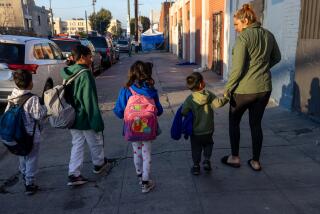Escondido Council Approves Permit for Soup Kitchen Despite Protests
Escondido’s homeless were granted a permanent home by the City Council on Wednesday night over objections from neighboring residents and merchants.
The council granted a conditional-use permit to the North County Interfaith Council to operate a soup kitchen and homeless shelter in an aging shopping center on Rose Street near Valley Boulevard in eastern Escondido.
The city will purchase an office building in the small commercial center with federal Housing and Urban Development funds, then lease it to the Interfaith Council as a shelter for the homeless. The shelter will include daily food service, a 10-bed dormitory, a food bank, and legal aid and counseling services.
The site, just off Valley Boulevard and across the busy arterial from the Escondido Village Mall and Vineyard shopping centers, gained City Council approval over a building on South Escondido Boulevard, in a residential neighborhood.
Renovation Needed
The Escondido Boulevard building, which earlier was narrowly approved as the site for the shelter by the city Planning Department, also brought more than 200 irate neighbors out in protest.
The homeless center is now in a former church building at 7th and Redwood streets, but another site for the operation has been sought because city building officials said the current building requires extensive renovation.
A spokesman for the owners of property adjacent to the Rose Street site said the San Diego law firm of Asaro and Keagy has been hired and has given the opinion that the homeless facility can be challenged on legal grounds. Inverse condemnation, the lowering of property values and the lack of an environmental review were cited as “substantive issues.”
City Atty. David Chapman said he believes the project is exempt from state environmental review requirements and that the city is not at risk in approving the project.
Six-Month Review
Council members agreed to review the operations of the homeless center in about six months to determine if concerns of the neighbors about loitering transients have proved true, and to beef up police patrols of the area.
Residents protested that large numbers of homeless people would be attracted to the site for daily hot meals in the morning and would loiter in the area, scaring away shoppers and harassing residents.
Some opponents said that nearby Washington Park would become a campground for those attracted to the shelter, making the playground unsafe for neighborhood children.
Interfaith Council leaders pledged to prevent homeless people from remaining in the area after the morning meal, at which each person is given a sack lunch for later in the day.
The homeless program has been operated by the nonprofit religious group since 1981, chiefly with volunteers and donations, plus trained professional help who supervise volunteers and offer job counseling and other services aimed at rehabilitating the homeless.
More to Read
Sign up for Essential California
The most important California stories and recommendations in your inbox every morning.
You may occasionally receive promotional content from the Los Angeles Times.










